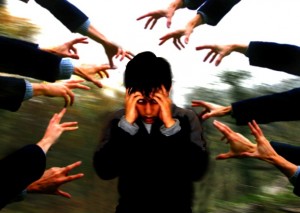
 Mental health problems can cover a broad range of disorders, but the common characteristic is that they all affect the affected person’s personality, thought processes or social interactions. They can be difficult to clearly diagnose, unlike physical illnesses. According to data from SAMHSA, 20 percent of people in America suffer from a form of mental disorder, and 5 percent suffer from a disorder severe enough to affect school, work, or other aspects of daily life. If you think that you or someone you know has a mental disorder, call us today at .
Mental health problems can cover a broad range of disorders, but the common characteristic is that they all affect the affected person’s personality, thought processes or social interactions. They can be difficult to clearly diagnose, unlike physical illnesses. According to data from SAMHSA, 20 percent of people in America suffer from a form of mental disorder, and 5 percent suffer from a disorder severe enough to affect school, work, or other aspects of daily life. If you think that you or someone you know has a mental disorder, call us today at .
What Are the Types of Mental Health Disorders?
Mental health disorders occur in a variety of forms, and symptoms can overlap, making disorders hard to diagnoses. However, there are some common disorders that affect people of all ages.
Attention Deficit Hyperactivity Disorder (ADHD)
Attention Deficit Hyperactivity Disorder is characterized by an inability to remain focused on task, impulsive behavior, and excessive activity or an inability to sit still. Although this disorder is most commonly diagnosed in children, it can occur in adults as well.
Bipolar Disorder
Bipolar disorder causes a periodic cycling of emotional states between manic and depressive phases. Manic phases contain periods of extreme activity and heightened emotions, whereas depressive phases are characterized by lethargy and sadness. The cycles do not tend to occur instantly.
Depression
Depression covers a wide range of conditions, typically defined by a persistent bad mood and lack of interest in pursuing daily life, as well as bouts of lethargy and fatigue. Dysthymia is a milder but longer-lasting form of depression.
Schizophrenia
Schizophrenia is not, as commonly thought, solely about hearing voices or having multiple personalities. Instead, it is defined by a lack of ability to distinguish reality. Schizophrenia can cause paranoia and belief in elaborate conspiracies.
What Causes a Mental Health Disorder?
There is no single cause for mental health disorders; instead, they can be caused by a mixture of biological, psychological and environmental factors. People who have a family history of mental health disorders may be more prone to developing one at some point. Changes in brain chemistry from substance abuse or changes in diet can also cause mental disorders. Psychological factors and environmental factors such as upbringing and social exposure can form the foundations for harmful thought patterns associated with mental disorders. Only a certified mental health professional can provide an accurate diagnosis of the causes of a given disorder.
 What Are the Signs of a Mental Health Disorder?
What Are the Signs of a Mental Health Disorder?
Mental health disorders exist in broad categories: anxiety disorders, mood disorders, psychotic disorders, personality disorders and impulse control disorders. If someone you know experiences erratic thought patterns, unexplained changes in mood, lack of interest in socializing, lack of empathy, inability to tell the difference between reality and fantasy, or a seeming lack of control, that person may have a mental health disorder. This is, by no means, a complete list of symptoms.
Emotional Symptoms of Mental Health Problems
Mental health problems can cause a wide variety of emotional symptoms, some of which include:
- Changes in mood
- Erratic thinking
- Chronic anxiety
- Exaggerated sense of self-worth
- Impulsive actions
Physical Symptoms of Mental Health Problems
Mental health problems typically do not cause physical symptoms in and of themselves. Depression, however, can indirectly cause weight loss, fatigue and loss of libido, among others. Eating disorders, a separate class of mental health disorders, can cause malnutrition, weight loss, amenorrhea in women, or electrolyte imbalances caused by self-induced vomiting. This makes eating disorders among the most deadly of mental health disorders.
Short-Term and Long-Term Effects of Mental Health Instability
In the short-term, mental health problems can cause people to be alienated from their peers because of perceived unattractive personality traits or behaviors. They can also cause anger, fear, sadness and feelings of helplessness if the person does not know or understand what is happening. In the long-term, mental health disorders can drive a person to commit suicide. According to the National Institute for Mental Health, over 90 percent of suicides have depression or another mental disorder as factors.
Is There a Test or Self-Assessment I Can Do?
It is hard, bordering on impossible, to accurately diagnose yourself for mental disorders with an online questionnaire. You do not have an objective view of yourself and are bound to answer questions inaccurately. Also, online tests are not comprehensive, so they do not check for all possible symptoms. Only a face-to-face session with a qualified mental health professional can begin to diagnose a mental health disorder with any degree of accuracy, because that professional has an outside viewpoint and can pick up on subtle cues.
Medication: Drug Options for Mental Health Issues
Fortunately, prescription drugs can be used to treat mental health disorders in conjunction with behavioral therapy or cognitive therapy. Antidepressants, mood stabilizers, and antipsychotics are the broad types of medication prescribed to treat mental illness.
Mental Health Drugs: Possible Options
Depending on the disorder, different medications will be prescribed. Antidepressants such as Paxil, Zoloft, Prozac, and a variety of SSRIs, SNRIs and MAOIs can be used to treat depression. Mood stabilizers such as lithium tablets are used to treat bipolar disorder, as are anticonvulsants like Depakote. Antipsychotics like olanzapine or clozapine are used to treat schizophrenia or psychotic depression.
Medication Side Effects
Some of the side effects of mental health medication include nausea, headache, changes in appetite, dry mouth, increased urination, change in libido, irritability, blurred vision and drowsiness. Other side effects can occur; each person’s body and brain chemistry is unique, and it is impossible to predict with certainty how a given medication will affect you or how well it will work. People who are prescribed these medications should regularly communicate with their doctors and notify them of any side effects.
Drug Addiction, Dependence and Withdrawal
Some mental health medications are known to cause physical and psychological dependency due to their changes in brain chemistry. Over time, dependency can become an addiction if the person isn’t careful. The withdrawal process can exacerbate the original mental illness because of the brain’s sudden loss of some chemicals such as serotonin, dopamine, and other endorphins. In severe cases, the person may need to be placed in a drug rehab facility to detox from prescription medication.
advice on how to use honey for a sore throat how to use tanf benefits how long does leftover hamburger helper last How to use garageband tips and tricks? What does omnichannel mean? What is the meaning of the name elena? How to delete zoosk account? How to screen mirror on roku? what is trisomy definition how to improve name recall How to stretch quads? What is aggravated assault? What does gig mean? How to steam eggs? how to improve the tone on the bb trumpet what is the difference between health & wellness how to improve programming skills what is the best advice for kids about bullying How to clean leeks? what is a king's ward definition What does filet mignon mean? Which word has almost the same meaning as the word? Why do some christmas lights have red tips? How fast do the tips of windmills go? how to earn daredevil skills in forza horizon 5 What does a hornets nest look like? what skills did howard schultz have to be successful How to cancel hbo max? What does an environmental engineer do? how to measure dick length What does read between the lines mean? what is statement of advice How to paint tips of nails? How to download music to mp3 player? How to calculate your grade? How to do stage magic tricks? bad advice: how to survive and thrive in the age of bullshit venus nicolino how long does it take for muscle definition to show what are some personal management skills I don't know where we stand meaning? what skills are required for intercultural communication How to tell if ground turkey is bad? How to massage feet? How to grill steak on gas grill? Who has the biggest brain tips?RELATED VIDEO










